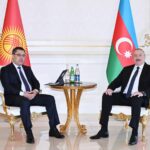The conflict has also caused the human tragedy and the suffering of the Azerbaijani and the Armenian people. Negotiation process under the auspices of the OSCE Minsk Group has failed because Yerevan abrogated the previously reached agreements and principles established during the decades of the negotiation process . Consequently, the brewing tensions and provocations finally boiled over into a large-scale military counteroffensive by the Azerbaijani army, which has gone down in history as the 44-Day War.
The 44-day Second Karabakh War ended when Azerbaijan, Armenia, and Russia signed the trilateral ceasefire agreement on November 10, 2020. Under this deal, 1,960 armed troops, 90 armored vehicles, and 380 motor vehicles and special equipment units have been deployed to the Karabakh region. Moreover, a “Joint Russian–Turkish Center for Monitoring the Ceasefire” was opened in the Agdam region to monitor the implementation of the ceasefire. The November deal became an important document that ended hostility and military operations. According to the document, Armenia pledged to return Agdam, Kalbajar, and Lachin districts to Azerbaijani control, while Azerbaijan guaranteed the security of the Lachin Corridor, to be used as a humanitarian connection between Armenia and Armenians living in Karabakh.
September 27, 2021 is a noteworthy date for Azerbaijan as the country marks the first anniversary of the 44-Day War victory. Having restored its territorial integrity, Azerbaijan has played a central part in ushering in a new era in the South Caucasus: an era of opportunity for peace and development. Since the 44-Day Wat has ended the Karabakh conflict, during the post-war period, the key aim of the parties should be the support of the restoration of economic relations by opening transport links and the demarcation/delimitation of the state boundaries to build sustainable peace.
Azerbaijan has already launched a large-scale program for the restoration of its liberated territories and development of all infrastructure in the region. Many international companies are taking part in this process. Those companies are working on the reconstruction of all necessary highways, railroads, and other infrastructure that are key elements in full economic integration. However, there are still challenges and difficulties in implementing all clauses of the November trilateral declaration, including Articles 4 and 9, which are important with regard to security and the future economic cooperation.
It is worth noting that Article 9 of the November deal stipulates that all communications in the region will be unblocked, including between Azerbaijan and its Nakhchivan region. With this in mind, it is necessary to emphasize the importance of Syunik/Zangezur province. The Russian border guards, who are protecting the Armenian-Iranian border will guarantee the safety of transport links between Azerbaijan’s western regions and the Nakhchivan Autonomous Republic of Azerbaijan.
The restoration of all roads and the establishment of the Zangezur corridor offer considerable advantages for Armenia. Reopening of transport links in the region will also solve one of the main economic problems of Yerevan, which is the absence of a land connection with the markets of the Russia-led Eurasian Economic Union.
It can also develop its economic relations with Iran. During the long-lasting conflict, Armenia has lost access to the railroad that used to connect the country to Iran via Azerbaijan. Therefore, restoration of this railroad will positively affect the bilateral relations between Yerevan and Tehran.
Despite positive dynamics, there are still challenges remaining towards the implementation of all clauses of the November, 2020 deal. Article 4 of the November declaration stipulates the deployment of Russian peacekeepers in parallel with the withdrawal of all Armenian armed forces. However, there are reports about this clause is repeatedly being breached. The continued transfer of Armenian military forces to Karabakh region through Lachin corridor is the major concern for Azerbaijan which could be the reason for further escalations in the region.
Today’s reality is the bloody war ended and economic opportunities are emerging in the South Caucasus. For Azerbaijan, the Karabakh war is over, and any negotiations over the future status of the Karabakh region are totally unacceptable. On the contrary, Armenia still insists on the future status of Karabakh, which shows that tensions between the parties would continue if there will no mutual respect for territorial integrity and sovereignty, the key principles of international law to ensure the stability and peace not only in the South Caucasus, but also in many other parts of our world.
Colin Stevens
EU Reporter










